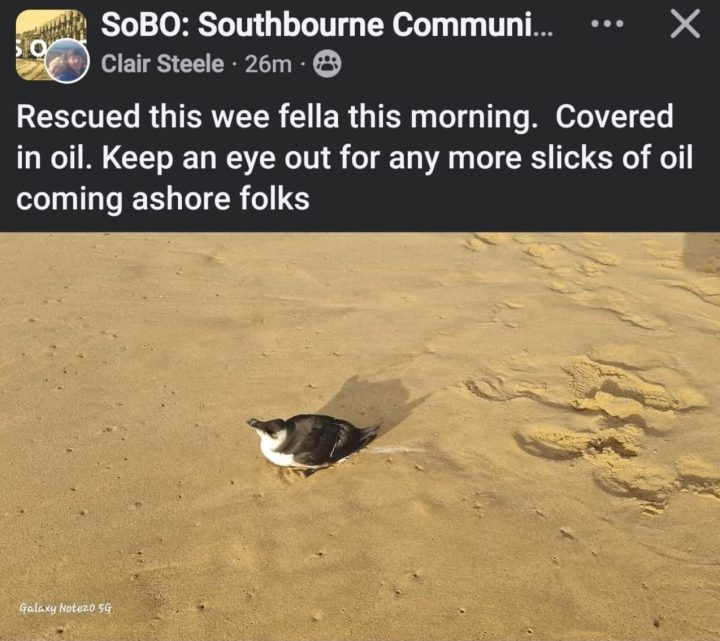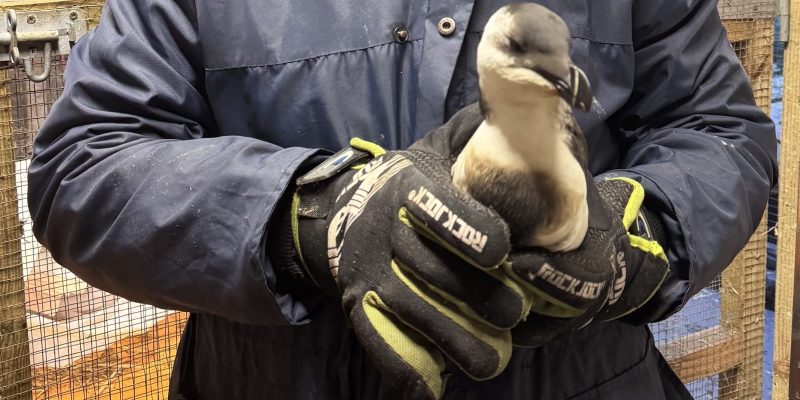A Razorbill found stranded and covered in oil on Southbourne beach has been rescued and is making a strong recovery thanks to the dedicated team at Dorset-based charity Wildlife In Need.
The bird, affectionately nicknamed “Henry” by volunteer Alan Clifford, was spotted by a member of the public who shared their concern on social media.
“The bird was spotted on its own on Southbourne beach with a lot of oil contamination and was sort of unable to fly. Somebody posted on Facebook that they had seen this bird, and one of our volunteers went straight down and collected him.”

In addition to a careful feeding regimen, the team administered milk thistle to help stimulate Henry’s liver and flush out toxins.
Clifford said, “Since being here, the Razorbill has responded well to our attentions. We were cautious about feeding it to start with because you don’t want to give a bird a load of food if its digestive system is being mucked up due to oil.
“So we were doing one fish an hour and then waiting for poo to come out. Once we started to see the poo coming out in the right colour, we knew that his insides were all right.”
The next hurdle will be removing the oil from the bird’s feathers- a process that can only begin once the oil has dried slightly.
For now, Henry is content in his temporary home and is making significant progress under the care of the sanctuary.
Clifford joked, “At the moment, he’s just on a lovely extended holiday with food provided and entertainment in the form of people coming in and out of his room to get towels because he’s in the towel storage room. So he’s head of towels while he’s here.”
Video by Alan Clifford, volunteer at Wildlife In Need.
While Henry’s story highlights the incredible work Wildlife In Need does, it also underscores the ongoing challenges the charity faces.
Entirely reliant on donations, the organisation is appealing to the public for support to expand its facilities and provide care for more birds.
Last year, thanks to a grant from the RSPCA and public donations, the charity upgraded its headquarters with essential features like shelving, a triage area, and double sinks.
However, the charity now urgently needs more aviaries to accommodate the hundreds of birds they rescue each year.
“Judging by the number of seagulls that came in last year, if we’re going to try to do the same this year, we will need double the size of the aviaries because, frankly, last year we were overrun.”
These facilities are essential for freeing up space for new arrivals in intensive care, ensuring every animals get the attention they need.
The sanctuary currently cares for a wide range of wildlife, including seagulls, swans, geese, and pigeons, which consume over 40 kilograms of frozen fish weekly, as well as other specialised food.
“Food cost is probably the biggest outgoing week by week and we probably get through 40kg of frozen fish feeding the gulls that we have here per a week.
“Not including the seed the pigeons eat and the special food for the swans, geese and ducks. You’re looking at 3 figure sums easily per a week just for food.”
As Henry’s journey to recovery continues, Wildlife In Need remains committed to giving every bird a second chance.
The charity’s work not only saves lives but also fosters a deeper connection between people and the natural world.
“There are specific things that we like to get donated, like towels and newspapers, money of course, but time as well.
“You don’t need to be skilled at anything—you will be trained.
“You’ll find your level, whether that’s here or anywhere that’s involved with animals.
“Go along and make yourself available and you will learn skills and meet people and develop relationships with animals that are unbelievable.”
For those inspired by Henry’s story, donations and volunteers are always welcome.
“Without wildlife, we wouldn’t have a human race. Wildlife has given us an existence. I think as humans, we need to give wildlife its chance to survive.”
You can donate to Wildlife In Need through this link: https://www.wildlifeinneed.co.uk/page_donate.html


 Nineteen-year-old Chelsea talent reportedly signing for the Cherries
Nineteen-year-old Chelsea talent reportedly signing for the Cherries